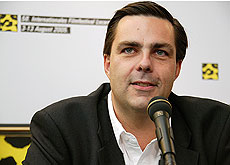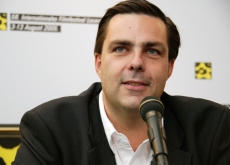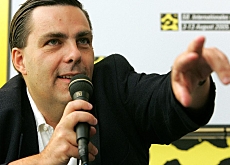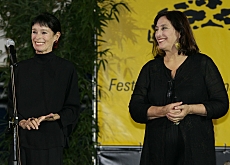Maire takes charge of Locarno

Frédéric Maire, the new artistic director of the Locarno International Film Festival, has already stamped his mark on the ten-day event, which begins on Wednesday.
Maire, a Neuchâtel-born film critic, director and co-founder of the Lanterna Magica children’s film club, officially took over from Irene Bignardi in October 2005.
Maire, 45, was appointed in August last year and immediately immersed himself in the Festival – now in its 59th year – although he has been closely involved in its organisation for more than two decades.
swissinfo met him in his office in Locarno, where the tension preceding an important first night was palpable.
swissinfo: How do you feel about your first public appearance as director?
Frédéric Maire: I’d be lying if I said I wasn’t slightly nervous. Although I’m very familiar with the Festival, I’ve never gone on stage in the Piazza Grande [the main town square] to introduce a film or address an audience of 8,000 people.
It would be strange if I didn’t feel excited – or indeed tense, like an actor making his entrance. But these are very pleasant feelings.
Regarding the Festival content, I believe we’ve achieved exactly what we set out to achieve: to make the Festival slightly more accessible where the main venue (the Piazza) is concerned and slightly more radical in other areas of the programme.
swissinfo: When you were nominated, you said you wanted to take the Festival back to its origins. How has this been going?
F.M.: I’d prefer not to talk about getting back to origins. I’d rather say we’ve tried to go forwards, building on the Festival’s historic foundation. The Festival is a building that is constructed stone by stone, year by year, but always on the same footings.
So I’ve started from that existing foundation: a Festival with the accent on discovery; a Festival that is free and which can also be bold in terms of programming; a festival that loves the whole spectrum of cinema: from the most classic films – in the Hollywood sense of the word – to the most radical.
swissinfo: How much longer will Locarno be able to host the Festival? Are urgent improvements needed regarding the logistics and the hotel facilities?
F.M.: Yes, something needs to be done fairly urgently. Not so much to improve the facilities and areas devoted to screening the films, but for accommodation. The lack of hotel rooms in Locarno is a problem, but we also need a greater variety of accommodation.
Of course, there is also a lack of quality auditoria for showing the films themselves. We are very much aware that the existing facilities are showing their age and are badly in need of restructuring.
But I realise that, given the present economic situation in this region, this represents a very expensive investment. I nevertheless hope that in the coming months we shall be getting some positive signals.
swissinfo: In the film festival world, how much pulling power has Locarno?
F.M.: Going by this year’s experience, I can confidently say that Locarno’s pulling power is greater than I had anticipated. I am proud to announce that we have secured films which other festivals, such as Venice, were competing for.
Comparing ourselves with some parallel sections at Cannes or Venice, we realised that we are just as strong as they are, especially where offbeat and unpredictable films are concerned – films which would draw an audience in Locarno, while in Venice they might go down like a lead balloon.
Locarno is still a point of reference for young directors who are less well-known but no less talented for that reason. The audience at Locarno is open to discovery – keen to learn new things and be taken by surprise.
swissinfo: What do you think of the films currently being produced internationally?
F.M.: I’m impressed by the quantity of films being produced, especially as a result of video having democratised the production process. It has become easier to make feature films with limited resources. But greater quantity does not necessarily mean greater quality.
However, thanks to video we can enjoy the work of a growing number of young directors – and some of them are making outstanding films. We’ll be presenting a lot of debut works this year, including in the Piazza. Some of them are amazing.
swissinfo: How about Swiss cinema?
F.M.: Still improving. Swiss cinema is doing good business at the box office – especially in the German-speaking area. French-speaking Switzerland and Ticino also need to recognise that Swiss cinema exists and is of outstanding quality.
At Locarno, there will therefore be a large number of Swiss films, spread over all sectors, including the Piazza Grande. The works we have chosen are powerful and very diverse: from conventional documentaries to more experimental works, even family comedy.
This proves that the vitality of Swiss cinema is no illusion, but a pleasing reality. It just needs discovering – in the purest traditions of the Locarno International Film Festival.
swissinfo, Françoise Gehring in Locarno
Locarno was founded in 1946. It is attended by 186,000 visitors and up to 4,000 professionals. The main award is the Golden Leopard.
The 59th Locarno International Film Festival runs from August 2-12, 2006.
Cannes was also founded in 1946, a month after Locarno. The May festival is reserved for industry professionals and up to 30,000 attend each year. The prize is the Palme d’Or.
Venice was created in 1932. It takes place at in late August and early September and the winning film receives a Golden Lion.
Frédéric Maire was born in 1961 in Neuchâtel to a Swiss father and Italian mother.
He has been making films since 1979, with a strong portfolio of fiction features and short films.
From 1988 to 1992, he taught an introductory course on audiovisual production at the DAVI film school in Lausanne.
In 1992, he co-founded the Lanterna Magica, a film club for young people aged six to 11, which he co-directs with Vincent Adatte and Francine Pickel.
From 2000 to 2004, he was a member of the committee of experts of the Montecinemaverità Foundation in Lugano.

In compliance with the JTI standards
More: SWI swissinfo.ch certified by the Journalism Trust Initiative



You can find an overview of ongoing debates with our journalists here. Please join us!
If you want to start a conversation about a topic raised in this article or want to report factual errors, email us at english@swissinfo.ch.